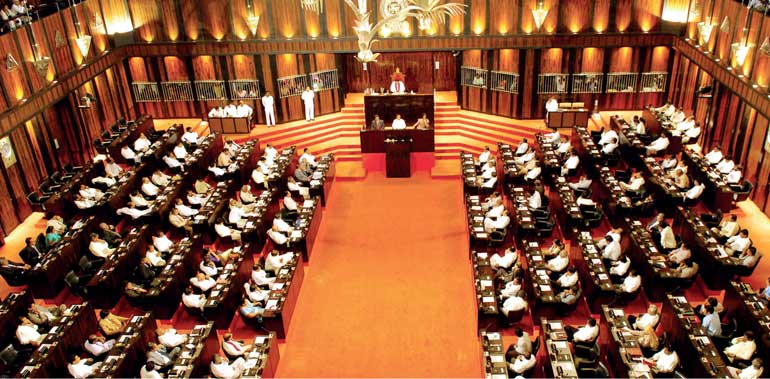Friday Feb 20, 2026
Friday Feb 20, 2026
Wednesday, 17 August 2022 00:00 - - {{hitsCtrl.values.hits}}

Advocata Institute’s recently concluded ‘Reset Sri Lanka’ conference covered numerous areas of necessary reforms across our social and economic landscape. They ranged from reforms in the tax regime to better targeting social safety nets to privatisation and/or restructuring of State-Owned Enterprises. Listening to each of the excellent presentations and panel discussions, there seemed to be one recurrent, underlying thematic root cause across many of these topics. And that is the entrenched politicisation of Sri Lanka’s state apparatus and the resulting sub-optimality at best, and complete dysfunctionality at worst, of each of its operating organs.
regime to better targeting social safety nets to privatisation and/or restructuring of State-Owned Enterprises. Listening to each of the excellent presentations and panel discussions, there seemed to be one recurrent, underlying thematic root cause across many of these topics. And that is the entrenched politicisation of Sri Lanka’s state apparatus and the resulting sub-optimality at best, and complete dysfunctionality at worst, of each of its operating organs.
To be more specific or elaborative, the following are some examples. In the order of the conference presentations, they are:
Starting with SriLankan Airlines. While the overarching decision to create and sustain a national carrier is a political decision made at the highest levels, the commercial operating dysfunctionality or non-viability is driven by the decisions made at the level of the entity’s board of directors. These directors in turn are political appointments made by either the ministry of finance or the ministry of aviation. Regardless, they are appointments made by whoever the presiding minister is. Whatever commercial decisions are made by the airline therefore are made, in essence, either directly or indirectly based on the needs or political objectives of a member or members of parliament.
The Samurdhi program is next. While there exists an arguably credible laid out mechanism and criteria for disbursement based on economic or social need, the practical execution and delivery is subject to the executive control of the minister in charge. And therefore, political interference and tinkering, and needless to say, for immediate political gain.
Taxation is probably less prone to direct ministerial influence as it is broadly set at a policy level and by Parliament as a whole. Nevertheless, enforcement and investigation are influenceable by way of direct ministerial intervention. The end result of this being the long-term propagation of a culture of tax avoidance among the public at large. With massive negative consequences for a society.
While losses in State Owned enterprises are driven largely by unviable pricing of their services, and in turn is a larger political or policy decision, it is clear that their large and inefficient cost bases are also driven by ministerial interference, be it corruption or sub-optimal commercial decisions and the largess of providing unsustainable employment, all for relatively short-term political gains.
Though trade policy, and specifically the dichotomy of deciding between Tradable Goods vs. Non-Tradable sectors is also largely a policy decision, the impact of ministerial or short-term political influences on these two sectors is profoundly different. Ministerial corruption or kickbacks have pricing implication on the non-tradable sector, and while directly impacting the consumer, is to some extent short term and could work its way out of the system. But such interference in the tradable sector will have long term investment implications, and thereby massive opportunity costs. Thus, the long-term impact to the overall economy and its structure given the importance of the tradable sector – as we have only too well experienced the consequences of today – and as brilliantly articulated during this session, is enormous.
Areas such as labour laws (and required reforms and modernisation) as well as corporate bankruptcy laws (also which may require some tweaking) are very much high level policy decisions. While there may be little to no direct ministerial influence or meddling in these for political or monetary gain, the corollary is that there is also little incentive at a ministerial level to enact the necessary reforms that are so sorely needed. No individual minister is likely to want to bear the political brunt of possibly unpopular reforms.
Unlocking the vast land banks which are under state ownership, be it for better agricultural productivity, more efficient urban planning, or the creation of productive industrial zones as was covered in the last three sessions, reeks with ministerial meddling and interferences, as is only too well experienced by multiple stakeholders involved in these areas. Corruption or parochial political interests by Ministers have long overshadowed or diverted the optimal and productive usage of such landbanks.
All of this points to one simple fact. Ministers wield far too much executive control over their respective ministries or institutions under their purview, and in some cases, they arguably shouldn’t exist at all. The origins of this could be traced back to the 1972 constitution, which effectively reduced the executive control over these functions held by respective Civil Service personnel and transferred greater power to legislators by way of the dismantling of the various independent commissions. Since then, the gradual erosion of competencies within the civil service, along with them being more beholden to their political masters for their own wellbeing, has further exacerbated the issue.
The results are devastatingly obvious. On the one hand it has led to corruption and the market distortions, inefficiencies and opportunity costs that result from it. Second it leads to vicious short termism (based on election cycles) as opposed to long term policy implementation and execution. Thirdly, it effectively decimated the intellectual capabilities of the civil services over time, either by way of making them ‘professionally impotent’ or worse, by gradually making the civil service an unattractive destination for employment for competent people. And finally, it places a person (parliamentarian) wholly unsuited, inexperienced, and unqualified for the executive role he/she bears. Notwithstanding the fact that they are also rotated ever so often under Cabinet reshuffles, thus removing and replacing whatever body of knowledge that may have been garnered in the first place.
While some attempt has been made to reverse this by way of the reconstitution of these independent commissions (first yet failed attempt in 2001), and now by way of oversight and appointments by a Constitutional Council under the 22nd Amendment, many constitutional experts have pointed out the overly politicised nature or these and their sub-optimality. Suggested oversight by proposed multi-partisan Parliamentary Committees for various sectors of government (over and above the COPE/COPA structures), while lauded and necessary, will also be sub-optimal given their irregularity and long-cycle oversight. None of these will address the fundamental issues articulated above.
The solution is simply to remove executive control by parliamentarian ministers over their respective line ministries and institutions by way of a strict constitutional enactment. A legislator should focus on his/her constitutional role as a policy maker, not as a policy implementer, at least not in a day-to-day executive role. He/She should be a conduit for escalating policy reform up to parliament, based on the feedback he/she receives from various line ministries, regulators and broader civil society representatives and organisations. And be the oversight authority on its implementation.
The running of these institutions on the other hand should be handed over to competent and experienced individuals with a track record, gathered from broader society including the Civil Service (or even overseas as certain cases may warrant) who would be nominated by Ministers and/or the Cabinet, vetted and endorsed by multipartisan Parliamentary Committees, voted in by parliament and beholden and accountable to both Cabinet and Parliament. Not unlike the system in the United States. These individuals of course will have to be granted full executive control over operating decisions of their respective entities, and in turn can be even partly remunerated based on performance, defined by quantifiable deliverables and KPIs.
The positive consequences of this are numerous and far reaching. While obviously it will bring best of breed knowledge and competencies into the various roles, the ‘depoliticisation’ will lend itself toward achieving long term policy driven goals as opposed to short term parochial political needs (and I daresay, it will also over time alter the behaviour of the body politic as well, who have hitherto got used to seeking favour through their representatives). The element of corruption will also be largely mitigated as it will pave the way for prosecution (and thereon its deterrent) in the event of any corruption, as the political impasse for investigating and prosecuting corruption, as is the current experience, will largely be eliminated as the target of prosecution will now be an apolitical one.
The nation’s current focus is on the dismantling, either partly or fully, the executive functions of the Office of the Presidency. This has both wide public support as well as broad parliamentary support, at least for a watering down of executive powers of the presidency. Most, if not all parliamentarians would have some at some point in their careers come face to face with the rather dictatorial nature of that office and would gladly see it cut down to size. Knowing very well that this would in turn effectively devolve more power to their own offices, hardly any parliamentarian would therefore agree to what has been suggested in this article. Hence any pressure toward such a constitutional amendment will have to necessarily come from wider civil society.
The separation of powers between the executive, judicial, legislative and civil service roles in a system of governance is sacrosanct for a modern stable human society. This stems of the fundamental premise that any concentration of power in any area of governance (or economic activity for that matter) leads to sub-optimal results for us human beings.
Many Sri Lankans, of all walks of life, have a penchant and allure for executive control. This stems from a culture of feudalism that, for a whole host of historical reasons, we are yet to shed. If we are to achieve the so called ‘system change’ that we so long for, its time we took an honest look at our cultural DNA, and altered it. Starting with our Constitution.
(The writer is a Consultant.)